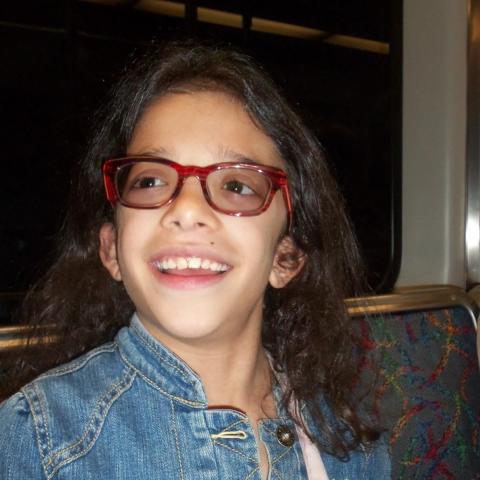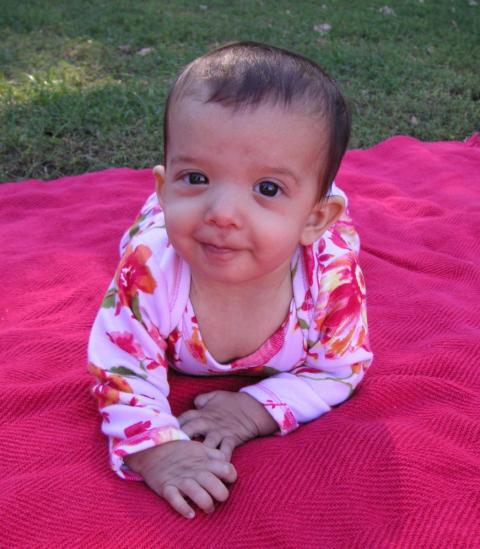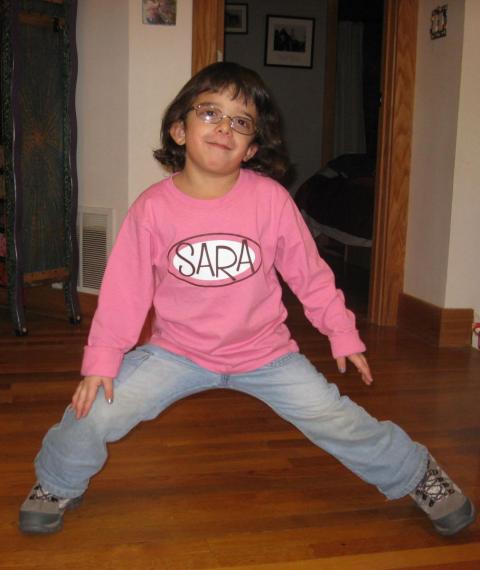Spunky Sara!
GEMSS would like to thank Sara and her mother for their generosity in sharing this story with us. You have made the site come to life with the addition of your thoughts and feelings. Thank you so much!


Sara was introduced to our GEMSS website by her geneticist as “Spunky Sara!” Sara’s mother Marla echoes the sentiment with her description of Sara as an extremely energetic little girl who is enthusiastic about almost everything and is “a lot of fun!” Sara is 9 years old and lives near Boston, MA. She is in third grade and is in all typical classes at her local community school.
“Many children with Ns have learning disabilities but Sara does not have any that are significant enough to be noticed at school,” says Marla. She describes Sara as a quirky kid who excels in her academics but “marches to the beat of her own drummer.” At one time, Sara did have an IEP to get physical, occupational and speech/language therapies in school, especially for articulation. However, she now has a 504 plan which is helpful for her vision and some GI issues. She has preferred seating so she can see well in the classroom and has access to the bathroom whenever she needs it.

She achieved her early gross motor milestones later than many children, but she now participates in kung fu and running programs with her peers.
Sara was diagnosed at about 6 months of age. A cardiologist noticed a heart murmur during her first few days of life and, although she did not have any of the more significant cardiac issues that many with Ns have, he later referred her family to a geneticist because he recognized other signs of Ns. Sara tested positive for a genetic mutation for Noonan that is present in about 50% of the people diagnosed with this syndrome. Prior to that, Sara had surgery when she was five days old to correct her severe laryngomalacia (floppy larynx tissue) that was causing breathing problems.

Over the years, she has had quite a few specialists in and out of her life. She is currently on growth hormone and is now about even height with some of the children in her class and she is now on the CDC growth chart. She sees an endocrinologist, ophthalmologist, Gastroenterologist, orthopedist, and geneticist. Although some children with NS may have a G-tube, especially during their first few years, Sara did not need one. She had supports to help her gain weight from nutritionists and speech/language pathologists, as well as her gastroenterologist.
Sara is very social and loves birthday parties, neighborhood block parties, and family events. She loves being in groups of kids and “loves life!”
Her mother Marla is active in supporting other families as part of an international Facebook group. She has also organized a regional support group to help local families connect with one another.
Marla, a former preschool special education teacher, has some advice to other parents whose children have NS:
-

- Because there is so much variation in each child, if you give any information (articles, etc.) about Ns to the school team, highlight the items that affect your child.
- Work with the school system for any IEP/504 accommodations. There are many things that can easily be done. For example, a small step stool at the sink for the shorter children may be needed, or an OT to help adjust the seating so feet are on a firm surface and the children have a good position for handwriting.
- Teach your child to advocate for her/himself. If there is a substitute teacher who isn’t aware of their needs, they may need to advocate for themselves.
Marla also passed on some ideas for teachers, school nurses, and others at school:
- Talk to parents about the specific issues for their child. The list of possible issues is so long, and no one will have all of the possible issues. Get parents to highlight the issues that affect their child.
- Sometimes, you would never even know a child has Noonan syndrome because they are so mildly affected.
- Fatigue and pain is very real for SOME children. They may need to be excused from gym or allowed to rest if they are fatigued.
- They may have some extra absences due to doctor’s appointments or fatigue.
